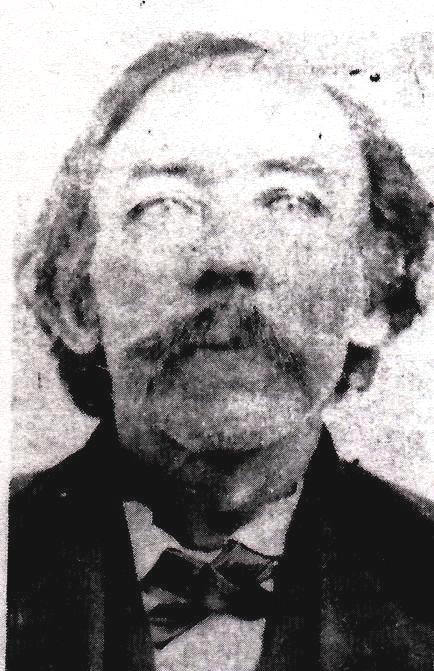HENRY GRUBER
Days of Gruber the Shoemaker Gone
By Marie Donnell - Date written unknown, from a clipping at Jennings County Public Library

Would you like to have a pair of fine leather shoes, custom-made with precision detail?
Would you like to walk into a shop and have your feet measured exactly for those shoes by skilled hands?
In his day, Henry Gruber had a pleasant, well-equipped shoe shop in Marion Township, Jennings County, that provided just those fine services. Born in 1826, Gruber was crippled as a small boy when a heavy barn door blew open against his legs during a severe wind storm. How much attention or what medical care he received, no one knows.
But it is known that somewhere, somehow, he learned the cobbler's trade and became famous for his craft for miles around.
Gruber made his home with a brother, Valentine Gruber, and Valentine's wife, Mary. They owned an amiable-looking two story home about 1 1/2 miles west of the Mount Zion United Methodist Church in Marion Township. Valentine built a substantial shoe shop at the rear of his home for Henry. Henry picked up his shoemaking supplies in Madison. It is not known from where came the fine leather he used for his shoes.
Records show that in the middle and late 1800s, farmers from Brownstown, Seymour and Columbus drove their cows, hogs, geese and turkeys to market at Madison. They followed trails, but mostly traveled along small creek beds.
It took several days to drive stock of many varieties to Madison. The farmers used dogs to help keep the animals in line. Turkeys were a problem because at dawn they would fly up into trees to roost, and the long walk was especially hard on the feet of geese. However, farmers learned that by placing a small amount of tar on the bottom of a goose's foot and by standing the birds in sand for a few minutes suitable shoes were made for the weary fellows.
Gruber's shop was not far from Tea Creek, a heavily traveled route to Madison. People on their way to market would stop and order new shoes. On their return, they would have cash to pay him.
One 90-year-old man said he remembers the shoemaker made him a special pair of boots with red tops.
Gruber died in 1901 and was buried in the Mount Zion Cemetery, where his family placed an unusual monument that is still in good repair. findagrave link
For many years the shoe shop remained just as he left it, extremely neat with a work bench, shoe forms and many tools.
The shoemaker never was pitied for his handicap, but was loved and admired-and even renowned-for his clever skill and efficiency.
Would you like to walk into a shop and have your feet measured exactly for those shoes by skilled hands?
In his day, Henry Gruber had a pleasant, well-equipped shoe shop in Marion Township, Jennings County, that provided just those fine services. Born in 1826, Gruber was crippled as a small boy when a heavy barn door blew open against his legs during a severe wind storm. How much attention or what medical care he received, no one knows.
But it is known that somewhere, somehow, he learned the cobbler's trade and became famous for his craft for miles around.
Gruber made his home with a brother, Valentine Gruber, and Valentine's wife, Mary. They owned an amiable-looking two story home about 1 1/2 miles west of the Mount Zion United Methodist Church in Marion Township. Valentine built a substantial shoe shop at the rear of his home for Henry. Henry picked up his shoemaking supplies in Madison. It is not known from where came the fine leather he used for his shoes.
Records show that in the middle and late 1800s, farmers from Brownstown, Seymour and Columbus drove their cows, hogs, geese and turkeys to market at Madison. They followed trails, but mostly traveled along small creek beds.
It took several days to drive stock of many varieties to Madison. The farmers used dogs to help keep the animals in line. Turkeys were a problem because at dawn they would fly up into trees to roost, and the long walk was especially hard on the feet of geese. However, farmers learned that by placing a small amount of tar on the bottom of a goose's foot and by standing the birds in sand for a few minutes suitable shoes were made for the weary fellows.
Gruber's shop was not far from Tea Creek, a heavily traveled route to Madison. People on their way to market would stop and order new shoes. On their return, they would have cash to pay him.
One 90-year-old man said he remembers the shoemaker made him a special pair of boots with red tops.
Gruber died in 1901 and was buried in the Mount Zion Cemetery, where his family placed an unusual monument that is still in good repair. findagrave link
For many years the shoe shop remained just as he left it, extremely neat with a work bench, shoe forms and many tools.
The shoemaker never was pitied for his handicap, but was loved and admired-and even renowned-for his clever skill and efficiency.
You may use this material for your own personal research, however it may not be used for commercial publications without express written consent of the contributor, INGenWeb, and